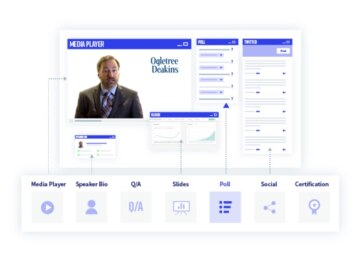The professional services industry is, by definition, a high-skill industry. Law firms, accounting firms and business consulting all focus possess narrow, focused expertise requiring a lot of time and knowledge to master.
It’s also an industry where various work elements are repetitive, tedious and resource-intensive — fertile ground for driving efficiencies through new technology. Artificial intelligence, for example, is steadily growing with a 6% growth rate in usage from 2020 to 2021 across all industries, according to McKinsey’s 2021 State of AI Report.
Why Are Professional Services Firms Facing Technological Change?

Increasing pressure from clients to deliver value at competitive prices – essentially do more with less – means that the sector needs to explore how disruptive technologies can transform the way they operate and deliver services.
Applications driven by artificial intelligence and machine learning have the potential to create efficiencies and broaden the types of services offered to clients. Spending several days reviewing documents or contracts should be a thing of the past; AI-based tools can carry out routine but complex tasks in minutes.
With AI industry-specific use cases proliferating at a staggering rate, professional services companies must contextualize data-driven insights fast and nimbly identify opportunities. The days of simply just processing rote information are near an end.
What Should Professional Services Firms Look For In a Technology Solution?

So how what type of technology will affect the professional services industry?
The first and most important goal of any tech addition is to drive better business services for clients. To do this, professional services firms need to drive efficiency, often through automation, auditing resources and refining business processes.
But digital transformation involves more than just automation — it also involves making more of what’s already there. Digital technologies, like CRMs, MAPs and digital event platforms can all be optimized to drive better operational efficiency for firms across the board.
Firms should look for solutions that enhance offerings, improve communication and provide clients with a superior digital experience.
Driving Real Digital Transformation with Tools Built for a Digital World

Let’s give an example. Let’s say a professional services firm provides highly specialized, high-value services. Its potential clients? They’re hesitant to separate from hard-earned money and would like to see some level of expertise.
Here, the firm can refer prospects to a webinar relevant to the subject at hand. After the prospect consumes the content, the firm can then see how engaged the would-be client is, respond to any questions they may have (both in real-time and through follow-up communications) and use artificial intelligence to serve up content that proves the firm’s thought leadership, value and trustworthiness.
And it should be able to do all of this without having to pick up the phone.
Remember that real digital transformation provides opportunities for firms to drive better efficiencies at every touchpoint — it’s not just AI.
Digital’s Growing Impact

The professional services industry seems to be already adept at turning investments in cognitive technologies into benefits.
Along with tech, media and telecom companies, professional services firms have made the highest investments and realized the highest returns. In the UK legal services sector alone, AI and automation are expected to accelerate productivity to almost twice its current rate by 2038, with large firms benefiting the most.
Chatbots are making headway in the professional services industry as well. These useful tools enhance the customer experience and pre-qualify leads by directing inquiries to relevant information in real-time. Firms can then use that information to fuel personalized follow-up conversations.
One example is Parker, an Australian law firm chatbot developed to give basic answers to questions before directing prospects to three fixed-price legal advice packages. The chatbot was responsible for selling $15,000 of different types of advice in its first 24 hours.
Tech Adoption is Accelerating

Professional services providers are often cited as slow technology adopters, but this is changing as competition adds to business pressure. However, investment in a shiny new tool, whether it is AI-powered or not, is not enough. Companies must understand the business case and formulate robust strategies to take advantage of the opportunity.
A lack of investment in the right skills is an area that professional companies will need to address. While the world’s largest professional services and consulting firms average 5,000 to 15,000 in-house analytics professionals, it is estimated that fewer than 8% of these are data scientists.
Future value in the industry will be derived from investing in cognitive technologies along with upskilling and recruiting new talent to unlock the opportunity they offer.
